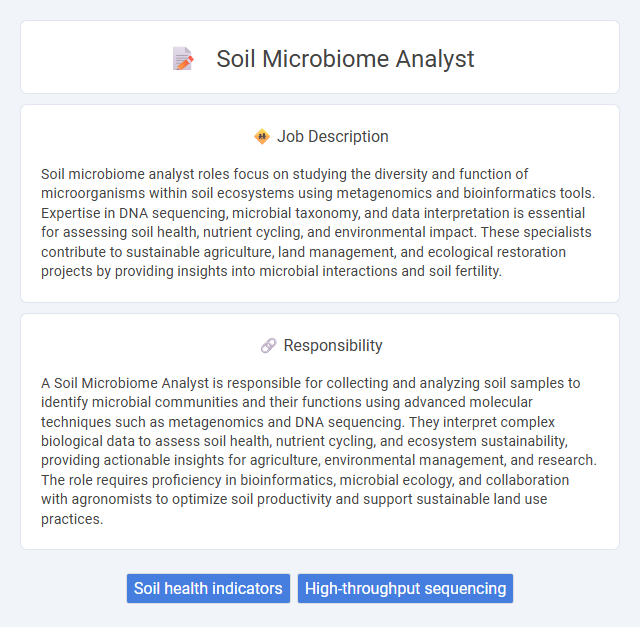
Soil microbiome analyst roles focus on studying the diversity and function of microorganisms within soil ecosystems using metagenomics and bioinformatics tools. Expertise in DNA sequencing, microbial taxonomy, and data interpretation is essential for assessing soil health, nutrient cycling, and environmental impact. These specialists contribute to sustainable agriculture, land management, and ecological restoration projects by providing insights into microbial interactions and soil fertility.
Individuals with a strong interest in biology, environmental science, and data analysis are likely to find the role of a soil microbiome analyst suitable and engaging. Those comfortable working in lab settings, interpreting complex data, and performing fieldwork may have a higher probability of success in this job. People who prefer routine tasks or lack patience for detailed research might be less suited for the dynamic and analytical nature of this profession.
Qualification
A Soil Microbiome Analyst must have a strong background in microbiology, molecular biology, or soil science, often supported by a bachelor's or master's degree in these fields. Proficiency in DNA sequencing technologies, metagenomics, bioinformatics tools, and data analysis software like QIIME or R is essential. Experience with microbial ecology, soil sample collection, and laboratory techniques such as PCR and next-generation sequencing enhances the candidate's ability to interpret complex microbial communities accurately.
Responsibility
A Soil Microbiome Analyst is responsible for collecting and analyzing soil samples to identify microbial communities and their functions using advanced molecular techniques such as metagenomics and DNA sequencing. They interpret complex biological data to assess soil health, nutrient cycling, and ecosystem sustainability, providing actionable insights for agriculture, environmental management, and research. The role requires proficiency in bioinformatics, microbial ecology, and collaboration with agronomists to optimize soil productivity and support sustainable land use practices.
Benefit
Soil microbiome analyst jobs likely offer significant benefits including opportunities for contributing to sustainable agriculture and environmental conservation. Professionals in this role may gain access to cutting-edge laboratory technologies and data analytics tools, enhancing their technical expertise. Career growth prospects probably exist due to the increasing importance of soil health in global food security and ecosystem management.
Challenge
Soil microbiome analyst roles likely involve navigating the complexity of diverse microbial communities, making data interpretation a challenging task. The probability of encountering unpredictable interactions among soil microbes may require advanced analytical skills and innovative methodologies. Challenges could also arise from integrating multi-omics data to accurately assess soil health and ecosystem functions.
Career Advancement
Soil microbiome analysts play a crucial role in studying microbial communities that influence soil health, agricultural productivity, and environmental sustainability. Career advancement opportunities include roles such as senior microbiologist, research scientist, or environmental consultant, often requiring expertise in bioinformatics, metagenomics, and soil chemistry. Professionals can further enhance their career trajectory by obtaining advanced degrees, publishing research, and gaining experience in interdisciplinary projects integrating microbiology and agronomy.
Key Terms
Soil health indicators
A Soil Microbiome Analyst specializes in identifying and quantifying microbial communities to assess soil health indicators such as microbial diversity, enzymatic activity, and nutrient cycling efficiency. Their expertise helps in monitoring soil organic matter decomposition, pathogen suppression, and balanced soil pH levels critical for sustainable agriculture. Advanced techniques like metagenomics and bioinformatics are employed to deliver accurate insights into soil ecosystem functionality and fertility status.
High-throughput sequencing
Soil microbiome analysts specialize in interpreting complex microbial communities using high-throughput sequencing technologies such as Illumina and Nanopore platforms. They process metagenomic and amplicon sequencing data to identify microbial diversity, abundance, and functional potential within soil ecosystems. Expertise in bioinformatics tools, including QIIME, Mothur, and custom scripts in R or Python, drives the accurate analysis of sequencing datasets to inform soil health and agricultural productivity.
 kuljobs.com
kuljobs.com